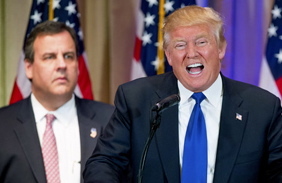With Super Bloated Tuesday 2016 relegated to the dustbin of history, the key questions for both parties' presidential campaigns are fewer and clearer.
Most immediately, Republican party leadership, if such a thing still exists, has to determine if it has any weaponry left with enough tonnage to stop Donald Trump.
If the firepower exists, then they must decide whether, how and when to unleash it with the hope of derailing the runaway Trump train. For Republicans seriously concerned about party preservation, the right answers to "whether," "how" and "when" are "yes," "with the kitchen sink" and "yesterday" or "last month" or maybe "Christmas 2015."
If the effort fails, Trump seems destined to become the Republican Party's nominee for president, which also will make him the uninformed formulator of its principles, the unintelligible articulator of its policies and the grotesque embodiment of its brand and image. That will leave the titular leaders scrambling between now and November 8 to contain the damage Trump is wreaking on a fractured party that was struggling with self-inflicted wounds well before the "short-fingered vulgarian" (props for the coinage to Graydon Carter, Spy Magazine, c. 25 years ago) wriggled up from the primordial ooze and into Republican politics.
Count South Carolina's Lindsey Graham among the seriously concerned. The third-term Republican senator -- and, before that, a four-term U.S. congressman -- competed for the Republican presidential nomination last year but never got any traction and dropped out just before Christmas.
Late last week, Graham told reporters at the Capitol that Trump becoming the Republican nominee would be disastrous for his party and, in his view, for the country. "I think he's going to lose and lose badly, and I think all the things we care about are going to be locked in place... You can't nominate a nut job and lose and expect it doesn't have consequences," he said.
That night, as a featured speaker at the annual congressional dinner of the Washington Press Club Foundation, Graham summed it up this way: "My party has gone batshit crazy."
A couple of days later, karma came back around on the Republicans with a vengeance. In a Sunday interview with CNN's Jake Tapper, Trump thrice denied knowing anything about white supremacists, about the Ku Klux Klan or about the notorious David Duke. Duke, whose connections with the Klan and other racist, anti-Semitic and neo-Nazi groups date back 40 years, has been urging whoever pays attention to him to support Trump. Trump had disavowed Duke on Friday but failed to say anything to Tapper about it. After the CNN interview, Trump restated, via Twitter, the disavowal of Duke.
Trump's fumbling of Tapper's softball invitation to separate himself from racist principles, organizations and individuals seemed fitting for the front-running Republican who has stood out for his use of ugly slurs about women, the disabled, people of certain national origins and religious beliefs and others he perceives as useful scapegoats for the genuine frustrations and bitterness of a sizable chunk of his supporters.
That includes white supremacists, as Evan Osnos has documented for The New Yorker, and Trump previously has ducked chances to clearly denounce them or even a chance to denounce, more recently, World War II-era Italian Fascist dictator Benito Mussolini.
But Trump's recent KKK/fascism moments also felt resonant with the last half-century of Republican evolutionary history, the party that elevated Richard Nixon to the presidency in 1968 on the strength of a new "southern strategy."
The approach -- clearly explained in a recorded 1981 interview by the ruthless, late Republican strategist Lee Atwater -- involved replacing the party's historical support for civil rights with policies, disguised behind coded language, that disadvantaged African-Americans disproportionately. This effectively extended aspects of the racist status quo and appealed to racist white southerners. The long-range scheme created a virtually solid Republican voting block across the American south.
Time, education, expanding social consciousness, racial and ethnic population shifts and new communications technologies have cracked that monolith. But the predominantly white, male, working class, aging and ideologically extreme Republican base seems to identify with Trump's swaggering and entertaining performance as Fed-Up Angry Guy. They also seem untroubled by the candidate's inconsistency, incoherence, intolerance and ignorance of issues.
Indeed, Trump's formidable acting chops are making powerful emotional connections that are still being underestimated, and not only by Republican leaders like Lindsey Graham.
Democrats finally are starting to take seriously Trump's potency as a candidate. But what they really need to do is finish picking their nominee and get on with the full-time task of designing and executing a detailed plan to beat Trump in November.
 The dominating primary showings of Hillary Clinton [AP PHOTO], including on Super Tuesday, and the primary schedule ahead point to her winning the nomination. At the same time, there's no denying the appealing directness of Bernie Sanders' positions on economic inequality, the outsized influence on politics of wealthy individuals and the financial services sector, the desirability of a single-payer health insurance system and more.
The dominating primary showings of Hillary Clinton [AP PHOTO], including on Super Tuesday, and the primary schedule ahead point to her winning the nomination. At the same time, there's no denying the appealing directness of Bernie Sanders' positions on economic inequality, the outsized influence on politics of wealthy individuals and the financial services sector, the desirability of a single-payer health insurance system and more.
The respective supporters of Clinton and Sanders, of course, have no trouble coming up with defects in their opponent's personalities and record of achievements or lack therof. But as important and even crucial as these matters are, they all became essentially irrelevant on February 13. That was the day Associate Justice Antonin Scalia of the U.S. Supreme Court died unexpectedly at a resort/ranch in southwest Texas.
Scalia's death changed everything. Instead of nominations of federal judges being just another presidential election year hypothetical, there is now a hard, cold reality: Someone will take Scalia's place on the Supreme Court, and that person will have a lifetime appointment.
By ruling out confirmation hearings or a floor vote for anyone nominated by President Obama, Senate Republicans have ensured that Scalia's replacement will be chosen by Obama's replacement. They are gambling, obviously, that a Republican will win the presidency in November and that the winner -- even if it's Trump -- would nominate a conservative to maintain the Court's long-standing tilt to the right on executive authority, environmental regulation, criminal and social justice, and corporate matters.
A new Democratic president, on the other hand, would nominate a liberal to replace the ultra-conservative Scalia, shifting the Court's balance to the left for the first time in decades. This raises the prospect of rulings on law and the Constitution that might be more attuned to the realities of 21st-century America and could improve the lives of people and families for generations to come.
With the stakes elevated to that level, all the issues of the Democrats' primary season have come down to just one: electability. Which Democrat is more likely to beat Trump in November: Clinton or Sanders?
It's not an easy call. The candidates' personalities aside, their respective positions on most issues differ less on substance than by degree. And even as president, either would have a tough time making headway with a progressive agenda if Republicans retained a majority in at least one house of Congress or if a new Democratic majority in the Senate fell short of filibuster-proof.
But a Democratic victory for the presidency would bring with it the nomination of a new justice to the Supreme Court and a once-in-a-lifetime chance to change the Court's ideological balance. How much are liberal voters willing to risk losing that -- and all that it could mean for themselves, their children and grandchildren -- by casting even a principled, but ultimately losing, vote that could throw the Court's future into Trump's hands?
A version of this column originally was published online and in print by the St. Louis Jewish Light.

